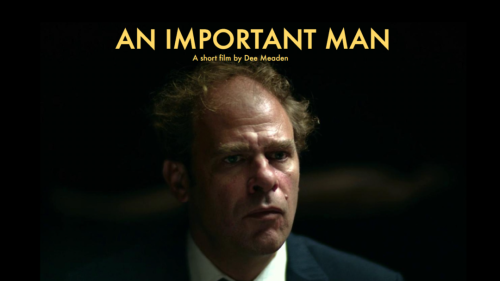Short Film ‘AN IMPORTANT MAN’
An original screenplay by Dee Meaden, a writer, director, and producer with over 20 years experience. Dee has written 5 original, feature-length scripts and written and directed 12 shorts.
Together with Flying Colours Productions, founded in 2021 by Charlie MacGechan and Kristen Tarry with the goal of bringing varied, diverse and authored projects to life, they will bring the Short to life.
‘An Important Man’ is a short drama exploring self-obsession, status anxiety and the damaging power of the drive to be heroic. A disenfranchised businessman Simon tries to restore suicidal Caleb’s faith in humanity but inadvertently undermines his own efforts through a desperate need for adulation.
The Plot
52-year-old Simon is a man many would deem successful. On the surface he’s a well-off family man with a steady job at an exciting company but underneath he’s yearning for applause, harbouring a secret need to be important.
In a bruising promotion interview he comes to realise those around him no longer see him as dynamic or exciting and is left wounded and disgruntled, blinded to the many privileges, or comforts his life affords him. When he, by chance, encounters the distraught Caleb, he’s keen to help him, to prevent the young man harming himself and although they’re from opposite walks of life they share a feeling of being unwanted or obsolete.
Through this point of connection and his impressive communication skills (which he sadly failed to demonstrate in his interview) Simon manages to restore the young man’s faith in humanity, only to alienate him a moment later through a fervent need to be seen and appreciated in his moment of heroism.
Writer Statement
‘An Important Man’ has grown from a fascination with our obsession with success and achievement and the way it underlines traditional notions of masculinity which require men to be impressive, dynamic leaders, whilst post Me Too, they’re also called upon to demonstrate their empathy, selflessness, and compassion.
Simon is at heart a good man, eager to help someone in need but there’s an ache inside him at his lack of success, a raw, urgent need for appreciation which leads him to use another man’s pain as an opportunity to demonstrate his greatness to the world.
When I was a small child, my father was an up-and-coming actor, playing ensemble roles at the RSC’s National Theatre but by the time I was a teenager, things had changed, and a deep disappointment started to bed into him. As he got older, I watched it destroy his sense of self, to eradicate any connection he had to his achievements as if he’d failed not just in his career but as an entire human being.
This story reflects my preoccupation with the way our ideas of who we need to be, can cause us to miss our own lives, to withdraw from a world we feel doesn’t want us or to harm ourselves and others through our desperate need to prove ourselves.
It is important to me that there is something reasonable in Simon’s need to be recognised and that we are inside his experience in the opening scenes of the film, able to feel both his hope and the stinging humiliation he suffers.
Only during the call with Claire, should we gently disconnect and view him from a slight distance, questioning the validity of how deep his need for recognition runs and waking up to how comfortable or even affluent his life is.
Even at the peak of our judgement, he’s a character for whom we should feel compassion, a man turning in on himself, a man for whom male friends are competition rather than confidantes and for whom even irrelevant passers-by can become an audience he needs to impress.
At the end of the film we should have a deep awareness that the tragedy he causes is one from which he’ll never recover and that no matter what he may achieve, no matter what recognition he may gain, he’ll be unable to see himself as anyone other than the person who caused a distressed young man to take his own life.
Production Company
Flying Colours Productions was founded in 2021 by Charlie MacGechan and Kristen Tarry with the goal of bringing varied, diverse and authored projects to life.
In 2023 they exec-produced the award-winning short ‘Incompatible’, directed by Maxine Peake, which screened at multiple BAFTA and Bifa nominated festivals. In addition, they joined David Harewood as exec producers on the award-winning ‘Monochromatic’ which has begun its festival run at the Oscar accredited HollyShorts festival.
Flying Colours also produces theatrical work and in 2024 brought the English language World Premiere of Sergio Blanco’s ‘When You Pass Over My Tomb’ to the Arcola. The company’s other stage productions include Harold Pinter’s ‘The Dwarfs’, (Best Ensemble Acting 2022 – Broadwayworld, Standing Ovation Award for Best Ensemble Acting 2022- London Pub Theatre Magazine) and the theatrical World Premiere of Philip Ridley’s ‘The Poltergeist’ (New York Times Critics Pick, 2023 Offie Award for Best Solo Performance).
If you have any questions please email [email protected]


















